You need to sign in or sign up before continuing.
Take a photo of a barcode or cover
A friend of mine described this book as being like the main character is doing one of those "Choose your own Adventure" stories and at every crossroads she makes the wrong choice. That's the best sum-up of House of Mirth Ever.
Poor Lily Bart is cursed with just too little moral backbone to keep out of trouble, but too much to get herself out of trouble once she's there. She's been brought up to believe she must marry a rich husband, but doesn't really want to do it, and she lacks the money to cushion her if she fails. Plus she's not as smart as she thinks she is, and doesn't know the world as much as she thinks she does. She's also surrounded by pretty awful people, not least of which is her less than useless true love.
It's a harrowing experience, but definitely an engrossing read! And Wharon is on fire in this book in her snarky and insightful commentary on the values and personalities of these people. She has to be to make it so very clear just what mistakes Lily is making and how badly they'll come back at her. In a way it makes you long for the Real Housewives franchise since those people, even when wealthy, at least are able to say what they mean and call others out on what they think they're doing.
In the end, if nothing else, she gains self-awareness and the ability to know what she really wants to do.
Poor Lily Bart is cursed with just too little moral backbone to keep out of trouble, but too much to get herself out of trouble once she's there. She's been brought up to believe she must marry a rich husband, but doesn't really want to do it, and she lacks the money to cushion her if she fails. Plus she's not as smart as she thinks she is, and doesn't know the world as much as she thinks she does. She's also surrounded by pretty awful people, not least of which is her less than useless true love.
It's a harrowing experience, but definitely an engrossing read! And Wharon is on fire in this book in her snarky and insightful commentary on the values and personalities of these people. She has to be to make it so very clear just what mistakes Lily is making and how badly they'll come back at her. In a way it makes you long for the Real Housewives franchise since those people, even when wealthy, at least are able to say what they mean and call others out on what they think they're doing.
In the end, if nothing else, she gains self-awareness and the ability to know what she really wants to do.
It took some time for me to get into this novel--a decided difference from when I read The Age of Innocence, which I do think is the best Wharton I've read. (I just remembered how much I hated reading Ethan Frome in high school...) However, Mirth's great protagonist Lily is so well-developed in her intellect about the society she plays in and the mistakes she knows she's making within that society. She's actually a very good person, but hardly any of the other characters recognize that in her. By the end of the book, I was sad for her trajectory, and quite angry at Selden--who, from the beginning, I thought would be a better man. He's just like the rest of them in my esteem. So often I cheered for Lily and her sometimes stubborn decisions, but in the end, it's just depressing. I enjoyed Wharton's writing, though.
Honestly thought I would enjoy this book more than I did.
It is good, the plot really takes a million twists and turns and it vaguely reminds me of Vanity Fair, which I love.
Unfortunately I found it difficult to read because of dense print and spacing on top of the authors flowery, circuitous language. ( which to be fair was also still enjoyable).
I didn't see the ending coming which was a nice change for a classic.
It is good, the plot really takes a million twists and turns and it vaguely reminds me of Vanity Fair, which I love.
Unfortunately I found it difficult to read because of dense print and spacing on top of the authors flowery, circuitous language. ( which to be fair was also still enjoyable).
I didn't see the ending coming which was a nice change for a classic.
So well-written.
I was watching "The Circle" while I was reading this - social gaming, always a thing.
I was watching "The Circle" while I was reading this - social gaming, always a thing.
dark
sad
tense
slow-paced
Strong character development:
Complicated
Loveable characters:
Yes
Diverse cast of characters:
No
I think this is my first Edith Wharton—I might have read Age of Innocence some years ago but that was back in the dark ages before I tracked my reading 🤔
Lily Bart is a 29-year-old unmarried woman during the Gilded Age who, by her own admission, was raised to be an “ornament” in society. The life she grew up in was one where she was trained to expect every luxury, even though as she grows older, she realizes that perhaps she has goals that are counter to the expectations others have of her. Her financial situation is becoming more dire by the day as she tries to keep up with her wealthier friends and she must marry soon to get out of debt.
Wharton’s writing isn’t dense like some other classics, but it does take a bit to get into the flow. But once you are in it—wow. She pulls apart the high society of New York like a surgeon, showing the falsities and hypocrisies of that set in spades, and how willing they are to turn on their own supposed “friend” when the tide swings against them. The author was also pretty masterful at lulling the reader into a false sense of complacency that slowly turns into a deep feeling of foreboding. Not a happy book, but worth reading.
Lily Bart is a 29-year-old unmarried woman during the Gilded Age who, by her own admission, was raised to be an “ornament” in society. The life she grew up in was one where she was trained to expect every luxury, even though as she grows older, she realizes that perhaps she has goals that are counter to the expectations others have of her. Her financial situation is becoming more dire by the day as she tries to keep up with her wealthier friends and she must marry soon to get out of debt.
Wharton’s writing isn’t dense like some other classics, but it does take a bit to get into the flow. But once you are in it—wow. She pulls apart the high society of New York like a surgeon, showing the falsities and hypocrisies of that set in spades, and how willing they are to turn on their own supposed “friend” when the tide swings against them. The author was also pretty masterful at lulling the reader into a false sense of complacency that slowly turns into a deep feeling of foreboding. Not a happy book, but worth reading.
I don't know, I mean, I want to like it, but I just can't. I didn't hate it, but it was predictable. Was it less so when it was first published? I know how I'm supposed to read it, but there is just something about the way she writes her stories that doesn't work for me.
קראתי בעברית. לא תמיד התחברתי לרקע החברתי ולכל הניואנסים שלו. אבל כבר מתחילת הספר נהניתי מהקריאה. הסוף טראגי ושובר לב.
----
יום אחרי שסיימתי, מוצאת את עצמי מחכה לקרוא ואז נזכרת בצער שהספר כבר הסתיים. זה לא קורה לי הרבה. אז כנראה שיש בו משהו מיוחד.
----
יום אחרי שסיימתי, מוצאת את עצמי מחכה לקרוא ואז נזכרת בצער שהספר כבר הסתיים. זה לא קורה לי הרבה. אז כנראה שיש בו משהו מיוחד.
What a beautiful, depressing book. I added another star after mulling it over for a night. It's an engaging, vivid description of upper class New York at the end of the 19th century, and an extended meditation on luxury's golden handcuffs. Miss Lily Bart is a beautiful fixture of high society, supposedly gifted with a keen social sense and ability to capitalize on every chance exchange. Presumably that's why, at the book's open, she's 29 and unmarried, cash poor, orphaned, and entirely dependent on the kindness of friends -- and still remains perched in the highest social circles. Yet, through the book, she makes one blunder after another, until the inopportune mounts into the tragic. My main criticism is that Miss Bart's trajectory makes little sense: as the plot shows, it takes more than beauty to survive among the petty, and she obviously managed it for 10 years before the story begins. That, and her moral sense is always conveniently blurry before an event, but crystalizes harshly and against her interest after the fact. Overall, it is a fine work, gorgeously written, and the characters stayed with me after I put the book down. I'll always hope for Miss Bart a new version, where the plot turns delicious rather than tragic, and she finally uses some of that keen social sense to her advantage.
Throughout the entirety of Book I, the plot seemed a little slow for me. I enjoyed this section for what it was, a critique of women's rights in the early 20th century. While I felt horrible for Lily and her situation, attempting to find a marriage for money because she had little for herself, I still cringed at some of the decisions she made (even if the author's point was that she had few other options). Overall I was underwhelmed by this first half and was dreading having to slug through the second portion, especially because it took me five days to get that far.
While Book II started off slowly, the action quickly picked up with Lily facing scandals abroad and attempting to pick up the pieces of her life while holding on to the strict morals everyone else believes she lacks. I'll admit, I started crying twice during this section when faced with Lily's slide into poverty while her former friends looked on. It was during this time that Lily's true strength became more apparent, as she worked to pay off money loaned to her based on her own morals. While I knew how the book ended before hand, I was still crying by the end
It was very easy to forget that the description of the narrators' thoughts were not always reliable. In many cases, Lily viewed situations in more rosy a light than they deserved, which I felt was very apparent in her description of Lawrence Selden. Selden provides a wonderful foil to Lily, representing what she could have been had she been a man. She herself notes on many occasions the freedom which she could have had to move about society and have affairs such as he did. Towards the end I came to detest him and his decisions. Although he constantly denounced the feelings of high society, and Lily almost hero worshiped him for his protestations, almost all his decisions regarding his relationships stemmed from societal whims.
This book averaged to 4 STARS. Book I was a 2 star read, but Book II redeemed the entirety of it, bringing up the overall rating.
Originally posted on: https://emiesnook.wordpress.com
While Book II started off slowly, the action quickly picked up with Lily facing scandals abroad and attempting to pick up the pieces of her life while holding on to the strict morals everyone else believes she lacks. I'll admit, I started crying twice during this section when faced with Lily's slide into poverty while her former friends looked on. It was during this time that Lily's true strength became more apparent, as she worked to pay off money loaned to her based on her own morals. While I knew how the book ended before hand, I was still crying by the end
It was very easy to forget that the description of the narrators' thoughts were not always reliable. In many cases, Lily viewed situations in more rosy a light than they deserved, which I felt was very apparent in her description of Lawrence Selden. Selden provides a wonderful foil to Lily, representing what she could have been had she been a man. She herself notes on many occasions the freedom which she could have had to move about society and have affairs such as he did. Towards the end I came to detest him and his decisions. Although he constantly denounced the feelings of high society, and Lily almost hero worshiped him for his protestations, almost all his decisions regarding his relationships stemmed from societal whims.
This book averaged to 4 STARS. Book I was a 2 star read, but Book II redeemed the entirety of it, bringing up the overall rating.
Originally posted on: https://emiesnook.wordpress.com




